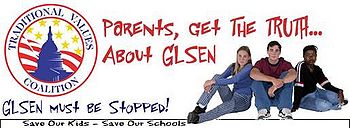State Sponsored Workshop - Educators Teach Kids Homosexual Sex
Cybercast News Service reported the following in respect to teaching homosexuality in schools:
| “ | Two Massachusetts Department of Education staffers lost their jobs because of their involvement in the state-funded workshop held at Tufts University in March 2000, called "What They Don't Tell You About Queer Sex and Sexuality in Health Class." The Gay, Lesbian and Straight Education Network [GLSN] co-sponsored the workshop.
Homosexual advocacy groups have been pursuing lawsuits against Camenker and Scott Whiteman, another parent, for secretly recording, exposing and publicizing the event, in which instructors encouraged children as young as 14 years of age to engage in life-threatening sex acts.[1] |
” |
Brian Camenker characterized a legal action taken against them by a homosexuality advocacy group as an attempt to put parents under financial burden and to dissuade others around the United States from exposing similar workshops.[2]
Cybercast News Service called the event "a state-sponsored workshop in which educators instructed teens in graphic homosexual sex."[3] Sean Hannity wrote about the workshop in his book, Let Freedom Ring, and William Bennett wrote about the workshop in his book The Broken Hearth.[4]
WorldNetDaily reported the following regarding the workshop that taught homosexuality to school children:
| “ | In the Boston press and elsewhere, GLSEN officials don't deny these things happened. They stand behind the conference. They're trying to say these kids were just asking questions and being told honest answers. This is a complete lie. The tapes prove that beyond a reasonable doubt.[5] | ” |
References
- ↑ http://www.freerepublic.com/focus/fr/837855/posts
- ↑ http://www.freerepublic.com/focus/fr/837855/posts
- ↑ https://www.cnsnews.com/ViewCulture.asp?Page=%5CCulture%5Carchive%5C200302%5CCUL20030206e.html
- ↑ http://www.freerepublic.com/focus/fr/837855/posts
- ↑ WorldNetDaily -Public employees teach kids 'gay' sex
